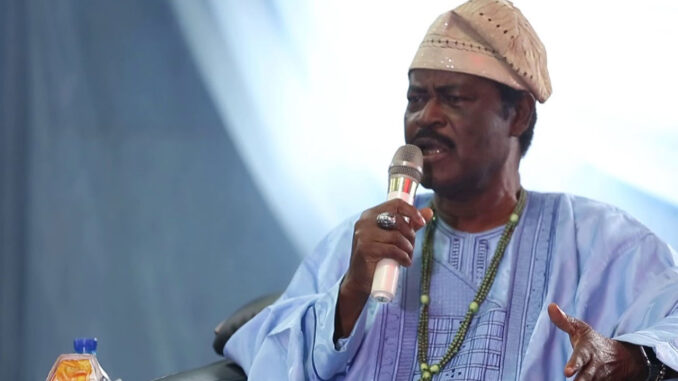
As I write this, I look forward to the day, the beautiful day, the historic day and historic time and historic prospect which we shall hail with fitness and firm firmness of joyful coo of patriotic liberty of NADECO and of poetry as conceived by the originators and all sincere joiners of the movement.
Now, why am I still dwelling on the subject I sincerely meant not to hurl furthermore into the magnificent river of our public opinion after the hint I gave last Friday? Several communications, verbal and written, I got have compelled me to say one or two or three or four things I deliberately allowed my reticence to keep in check. But rather than the full consciousness of my pen to do so, I am yielding, for now, the column to two readers from across the Atlantic. Before I do so, however, let me divulge this pertinent information.
It was the late Chief Michael Imoudu, our country’s universally acknowledged foremost Labour Leader, who asked MKO Abiola to go to Comrade Jonathan Ihonde to request him to plead his case and cause before Chief Tony Enahoro (and other patriots awaiting the historic opportunity we are still waiting to hail).
The late Festus Iyayi also played his own dazzlingly revolutionary part as an underground patriot of the movement. The late Abubakar Rimi and Balarabe Musa (both of the Aminu Kano school of politics) were top guns who similarly played their parts of positive dialectical patriotism in the Nigerian project and vision as conceived by the original NADECO.
As is well known, both of them were respective governors of Kano and Kaduna States under Aminu Kano’s People Redemption Party (PRP). Zamani Lekwot, an ex-military governor of Rivers State, Commodore Dan Suleiman, Professor Bolaji Akinyemi, the late General MusaYar’Adua, Mr. Fred Agbeyegbe and several others were lights of the movement. And I must underscore this point: M.K.O. Abiola became an authentic comrade who sacrificed his life for the NADECO cause – meaning that created situations can always alienate one from a reactionary pattern of life and turn him or her in the richest moments of his or her life to be a patriotic rebel and revolutionary. MKO Abiola’s open rejection by his former fellow reactionaries turned him into a comrade and rebel positively in the house of patriotic thunder.
Let me now open the minds of some NADECOists still on voluntarily patriotic exile.
“Good day, my dear Brother. Your piece on NADECO resuscitates memories of past opportunities and possibilities. NADECO was, as you correctly observed, a movement. But it was a movement of a special type peopled mostly by several left-wing leaning political activists. The intent in certain constituencies was for NADECO to metamorphose into a political party housing the Awoists and the talakawas of Aminu Kano, etc., into a new progressive entity. As is known in Political Science, a political party is a party when it survives its leader. Unfortunately, after the demise of Chief Obafemi Awolowo on May 9, 1987 (you and I stopped at Ikenne to pay our last respects to him on our way to Ibadan to watch Flash Flamingoes versus Leventis), his political party began to disintegrate systematically.
“Pro-democracy” is an elastic conglomerate of competing for ideological prisms. I recall meeting with Chief Tony Enahoro and Mr. Mike Ehimah in his hotel in Hull (now Gatineau) across the River Ottawa from the city of Ottawa. I accepted the invitation to accompany him to the Canadian House of Commons where he addressed members of Parliament on the atrocities of the Abacha regime. Several NADECO stalwarts, including Senators Cornelius Adebayo and Femi Ojudu, sought refuge in Canada during this period.
“That NADECO was conceived as a movement to restore the victory of MKO at the June 1993 Presidential Elections fostered an internal contradiction of political philosophies. Thus, NADECO was born prematurely by the need to honour the results of June 12 and not to propagate the ideals of left-wing or progressive politics epitomized by Awolowo. This, in my view, explained why Chief Tony Enahoro got involved in NADECO.
Viewed from this perspective, therefore, NADECO was a consortium of anti-military and pro-democracy activists. Chief Enahoro’s decision to establish the Movement for National Reform (MNR) was a product of the internal ideological contradictions in NADECO.”
These are pleasant words on NADECO that any investigator or researcher on the movement will or may find intelligently and persuasively instructive. They are theoretically and critically honey words – “sweet to the taste” and good for the well-being of all who want this country to always be blessed with the odour of all genuine activists and patriots like wine that sparkles.
Professor Igho Natufe’s words as quoted at length above are those of one underground NADECO patriot and good weigher of the movement’s weighable divinable morning and midnight dreams. And be it known that Professor Igho Natufe is a first-rate Political Scientist and a staunch Awoist. He has been underground in exile for centuries. Pardon my hyperbole. We share the same outlook about your country my country our country. But I have always insisted that I will never go on exile.
The words of another NADECO exile are particularly intriguing.
To be continued.
Afejuku can be reached via 08055213059.


Be the first to comment